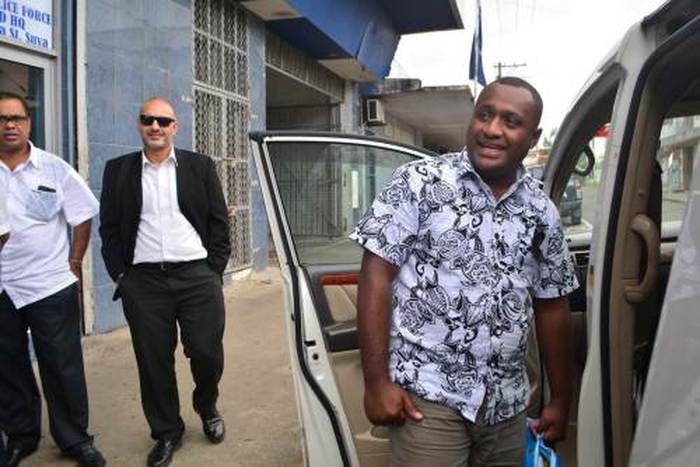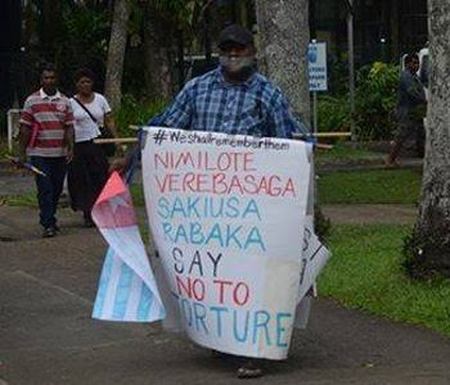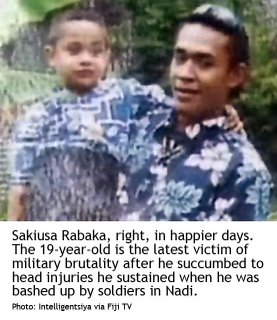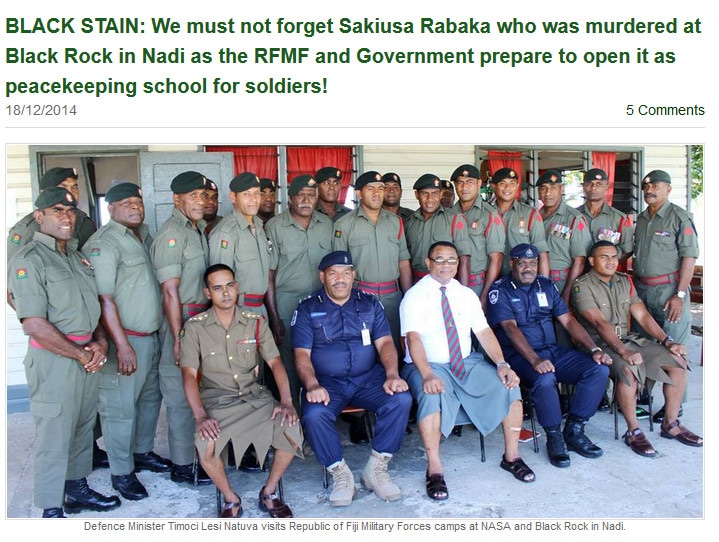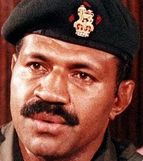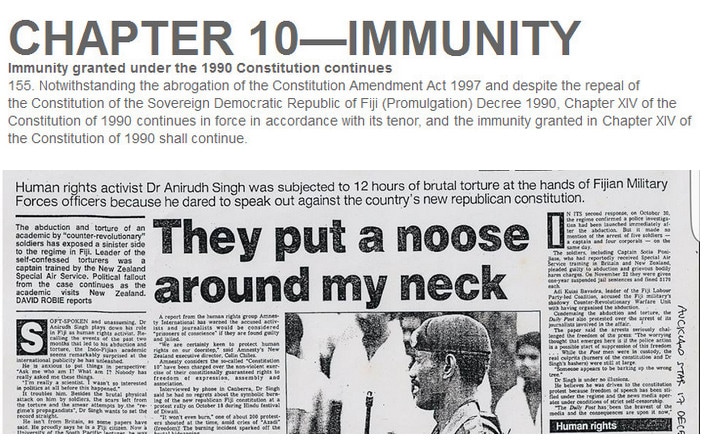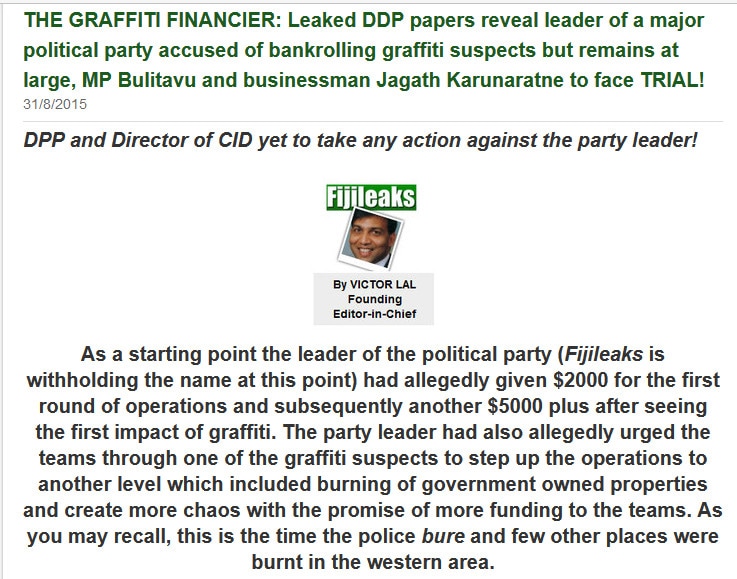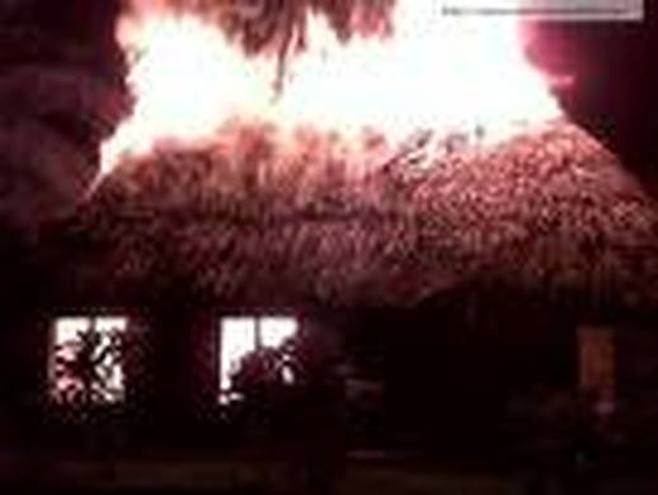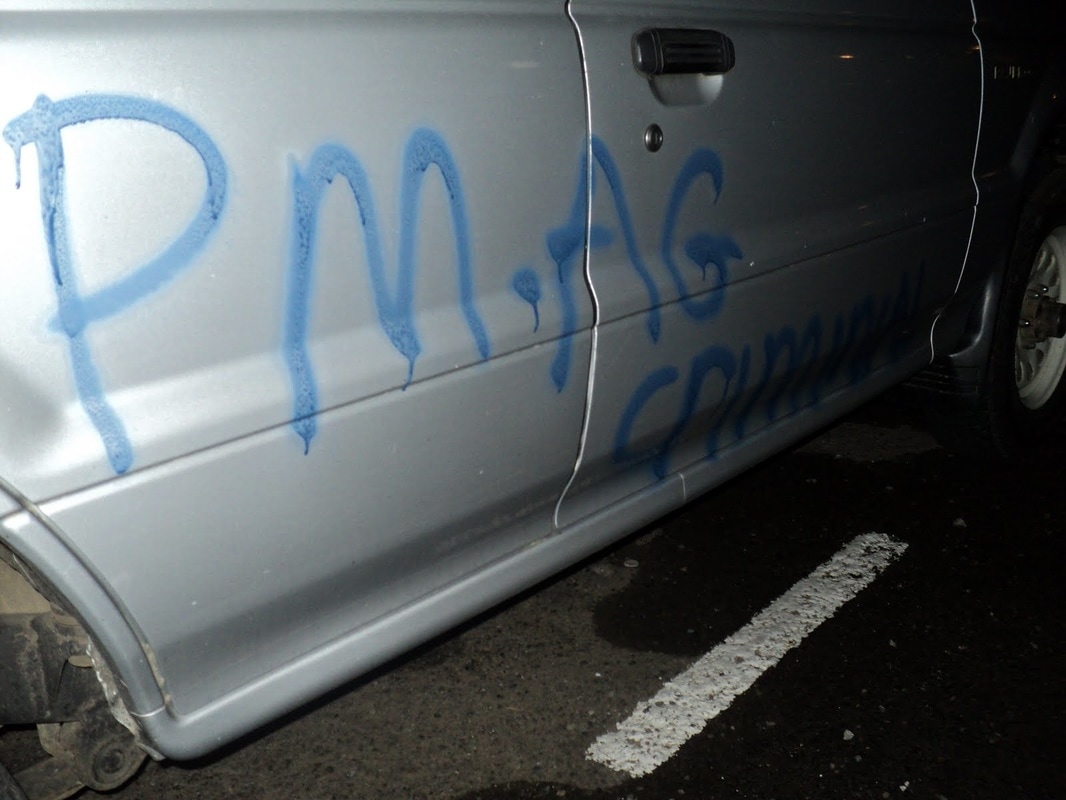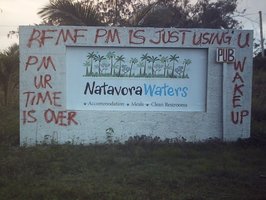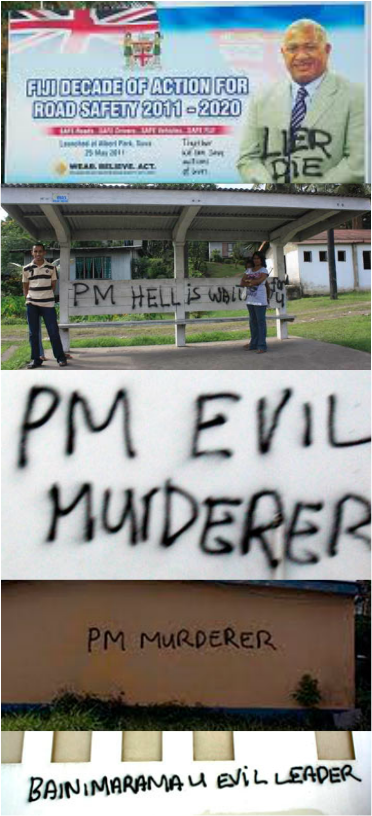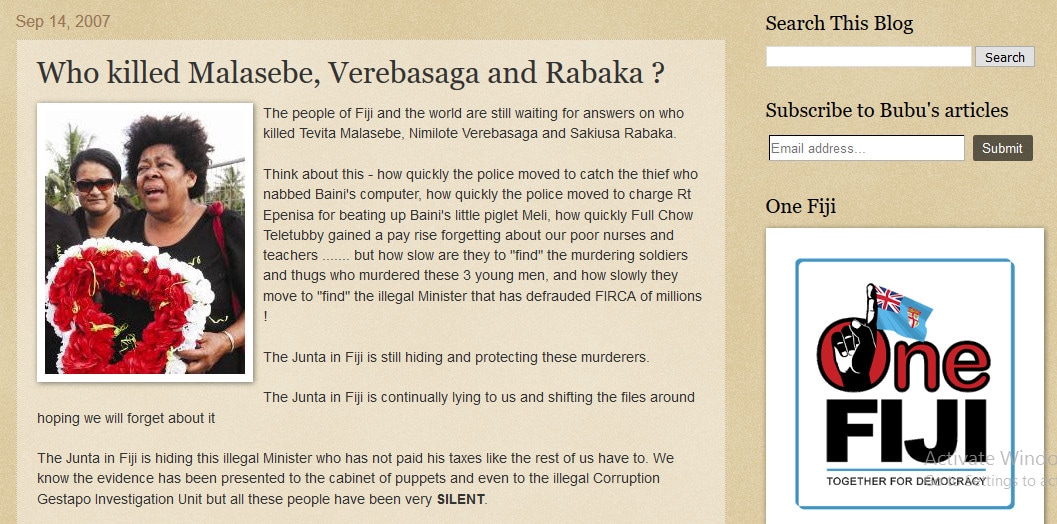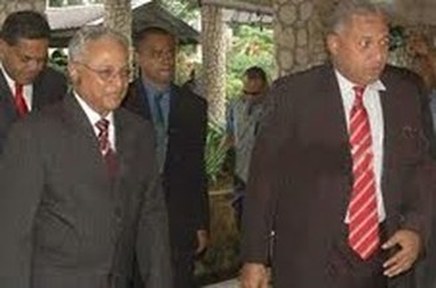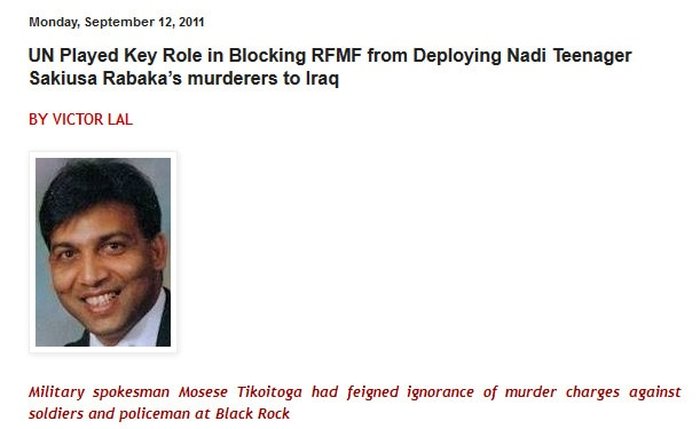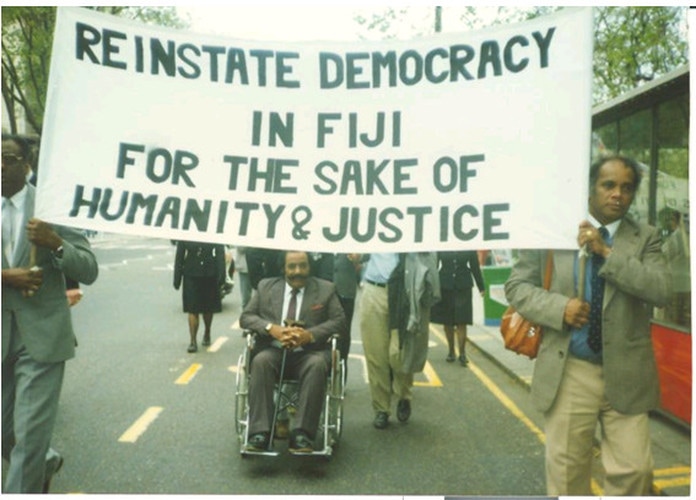"Fiji is fast deteriorating into a police state” - FLP leader Chaudhry
From Fijileaks Archive, 18 December 2014:
The Death of Sakiusa Rabaka at Black Rock Following Detention by the RFMF
On January 24, 2007, RFMF and police personnel detained four young men, including 19-year old Sakiusa Rabaka, ostensibly for smoking marijuana. They took the men to the Black Rock Military Base, near Nadi, and forced the men to participate in severe exercises, which included multiple beatings.
Among many indignities, the soldiers forced one man to perform oral sex on an unconscious co-detainee. The four were dropped off at a police station the following day, where they confessed to their crimes, and then released. Rabaka died as a result of injuries sustained during the assaults.
The RFMF attempted to frustrate the criminal investigation into this incident. The army refused to allow the police to interview eight RFMF soldiers suspected of involvement. The police then lost the file, necessitating that much of the investigation be redone.
The DPP ultimately charged eight RFMF soldiers and one police officer with murder, at which point the RFMF tried to send them abroad on a UN peacekeeping mission.
The attempt was nearly successful, with only a last minute intervention resulting in the accused being asked to de-board a UN chartered airplane at the airport. Following trial, all nine were convicted of manslaughter and assault occasioning actual bodily harm on March 17, 2009 and sentenced to four years, imprisonment.
The following RFMF soldiers based at the RFMF,s Black Rock Base in Nadi in February 2007 were convicted: (1) Taione Lua; (2) Ulaiasi Radike; (3) Etonia Nadura; (4) Ratunaisa Toutou; (5) Joeli Lesavua; (6) Jona Nareki; (7) Laisa Kurimavua (8) Napolioni Naulia Patrick Nayacalagilagi, a police officer at the Namaka Police Station in February 2007, was also convicted. US Embassy in Fiji to Washington: Wikileaks
VICTOR LAL: The principal THUG who has turned Fiji into an on-going "Police State" is the Father of Coups and Sodelpa leader Sitiveni Rabuka. We call on SODELPA youth leader Koroisavou to march against Rabuka, and for his removal as SODELPA leader. TORTURE is TORTURE. We must not forget to include SITIVENI RABUKA on the Torture Placard!
For too long political leaders have exploited others to further their political ambitions, leaving their followers to face the brunt of the law:
In fact, the UN had come down hard in 2007 when the murderous Fiji military and then Police Commissioner Esala Teleni had tried to secretly ship out for a United Nations assignment to Iraq eight soldiers and one policeman who were accused of sexual abuse, torture and cold blooded murder of 19-year-old Nadi teenager Sakiusa Rabaka.
The Nadi teenager had died in February 2007, a month after he and a group of friends were assaulted at the Black Rock military training base in Votualevu, Nadi. He was hospitalised and underwent surgery for brain injuries in the days prior to his death.
The soldiers Joeli Lesavua, Jona Nareki, Taione Lua, Napolioni Naulia, Ulaiasi Radike, Etonia Nadura, Ratunaisa Toutou, Ilaisa Kuruimavua and lone policeman Patrick Nayacalagilagi were jointly charged with one count of murder and four counts of assault occasioning actual bodily harm. They were, however, found guilty of a lesser charge of manslaughter, jailed for four years by regime’s lackey judge Justice Daniel Goundar. However, the killers were released within weeks on compulsory supervision order, prompting the DPP’s office to say that it was unusual for convicted criminals to be released so quickly after being sentenced for major crimes.
Bainimarama and Tikoitoga’s response to murder suspects Iraq tour
When Fiji media broke the story about the murder suspects being prevented from leaving for Iraq on Saturday 27 October 2007 the dictator, who has avoided a murder inquiry into his own conduct following the 2000 mutiny and deaths at Nabua camp, appeared on Fiji TV on 29 October. He denied any interference in the Rabaka murder case, claiming that he was helpless to stop any soldiers from going overseas on peacekeeping duties just because they were suspects in a murder case.
His side-kick and military spokesman Lt Col Mosese Tikoitoga said the Director of Public Prosecutions had not furnished them with a list of suspects. The Fiji Peacekeepers Association expressed concern that the soldiers implicated in the murder were not isolated from other soldiers. And Alinieta Rabaka, the mother of the late Rabaka told the press that she believed that the army had tried to send the suspects abroad to thwart the course of justice. Police, on the other hand, claimed that they were trying to establish why policeman and murder suspect Nayacalagilagi was booked on the Iraq flight.
Flight to Freedom Thwarted at Nadi Airport
On Tuesday 30 October the DPP’s Office disclosed that murder and assault charges had been laid against the nine accused on Thursday 25 October and it was forced to obtain a court order to bar the nine from leaving for peacekeeping duties in Iraq. The DPP said it had to intervene after attempts to talk to the military about Rabaka’s death had broken down. The charges were filed in the Magistrate's Court in Nadi on Thursday and the next day court summons were served on all. The DPP's Office said if the suspects had been allowed to leave on the UN-chartered flight on Saturday night it would have deferred the case for an indefinite period. In other words, the killers would have escaped justice.
The DPP issued a stop order to the Immigration Department at the Nadi International airport on Saturday. Immigration Director and military strongman Viliame Naupoto said the soldiers were taken off the flight by the army at the airport. He said the officers names could not have been on the Immigration “Watch List” if the officers made it through immigration. Tikoitoga refused to comment further, referring the press to speak to military arsonist and human rights abuser Lt Col Sitiveni Qiliho, who Tikoitoga said was responsible for the matter as he was in Nadi.
The Great Lie and Cover Up
But the Wikileaks cables from the US Embassy in Suva tell a very different story, exposing the lies and cover up of the murderous Fiji regime which was planning to send the Rabaka murderers to Iraq after the US led coalition had toppled Bainimarama’s dictator cousin Saddam Hussein, later executed for his crimes against the Iraqi people.
In one of a series of cables Larry Dinger, the then US ambassador to Fiji wrote to Washington on 25 October 2007, the day DPP had laid the charges. Under the heading “RFMF deploying murder suspects to Iraq”, Dinger wrote: “We have received information that o/a Oct. 27 the Republic of Fiji Military Forces (RFMF) will deploy to UNAMI in Iraq ten soldiers who allegedly participated in the beating deaths of two civilians early this year, the only confirmed killings related to the military “clean up” campaign after last December's coup. Ever since the beatings, the RFMF, the Fiji Police, and the Public Prosecutor Office have supposedly been investigating who did what, and consulting on what charges might be laid in what venue. It has appeared pretty obvious that the culprits were identified very early on. The endless to-ing and fro-ing since has brought repeated pleas from the families of the victims, the media, and human-rights activists for appropriate criminal trials and convictions.”
As usual, Dinger gave a background under the heading “The beating deaths: what happened”: “The military reportedly picked up Sakiusa Rabaka in the Nadi area on marijuana-related suspicions in early February. He returned home the following morning badly beaten, described his ordeal, and complained of a severe headache. Subsequent medical efforts to save his life failed. He died on Feb. 24.”
And contrary to the liar Tikoitoga that the Director of Public Prosecutions had not furnished them with a list of suspects, the US Embassy had the names of the murderers for a week, as Dinger disclosed to Washington under the heading “The alleged culprits”: “This week we obtained the names of the one RFMF suspect in the death of...9 RFMF suspects in the beating of Rabaka: Taione Lua (NCO); Patrick Nayacalagilagi (Private); Ulaiasi Radika (Private); Etonia Nadura (Private); Ratunaisa Toutou (Private); Joeli Lesavua (Private); Jona Nareki (Private); Ilaisa Kurimavua (Private); and Napolioni Naulia (Private). All ten reportedly are to depart for Iraq Oct. 27, and we are told the RFMF moved up the departure date, which was initially scheduled for a few weeks from now.”
Dinger commented in the cable: “...Rabaka's first-hand account before his death made RFMF involvement clear in his case. One Fiji Police officer was implicated, too. Commodore Bainimarama has stated publicly that the RFMF and the interim government (IG) would not obstruct justice in the cases; however, the military's actions have certainly impeded the process. There have been rumors for months that the RFMF had sent some or all of the perpetrators off to peacekeeping duties in MFO Sinai or Iraq to hinder investigations. The planned deployment of the ten soldiers this weekend, if it takes place, would clarify rumor into reality.”
Leahy Amendment sanctions and RFMF murderers
Dinger asked for guidance: “Since the deployments are to UNAMI (United Nations Assistance Mission for Iraq), we flag the matter to USUN for possible referral to UNPKO. We are also including the ten names on Embassy Suva's list for Leahy Amendment sanctions. Please advise if further Embassy Suva action is advisable.”
UN Key Role in stopping murderers’ flight to Iraq
On 29 October, the night the dictator appeared on Fiji TV and claimed that he was helpless to stop soldiers from going overseas on peacekeeping duties, Dinger told Washington under the headline, “UN letter halts RFMF plan to deploy murder suspects”:
“According to a well-placed embassy source in Fiji Immigration, a UN intervention is what kept the Republic of Fiji Military Forces (RFMF) headquarters from deploying 7 soldiers and one policeman, all charged with murder (see reftels), to UNAMI last Saturday. Reportedly a letter from the UN reached the RFMF leadership on Saturday p.m. stating that the 8 personnel were unacceptable to the UN. All 8 had been processed through Immigration and their baggage was on board the aircraft when the RFMF “move-con” officer pulled them back. A source noted to us that RFMF plans to send the 8 had moved ahead, despite a court summons (ref A) that was intended to halt the deployment. Then the UN letter arrived and brought activity to a halt. Departure of the aircraft was delayed by two hours as events unfolded. Earlier information indicated a total of 9 personnel were deploying. It is not yet clear what happened with the 9th, Private Etonia Nadura.”
Continued Dinger: “We have heard from the UNDP ResRep in Suva that he provided UNDPA a heads-up last week, “based on the rumblings in Fiji,” that allowed rapid consultations once the issue hit the media. The ResRep said he has since been out of the loop, as DPKO and UNDSS took over, apparently conversing with the Fiji mission in New York.”
Teleni complicit in badly behaved Patrick Nayacalagilagi flight plan
Under another heading “Senior Police complicity”, Dinger informed Washington: “An interesting aspect is that the one policeman implicated in the murder case was to be included in the deployment. Reportedly, when Commodore Teleni moved from RFMF Deputy Commander to Police Commissioner last summer, he made arrangements for police to join RFMF PKO deployments, particularly to MFO Sinai. The particular policeman, Patrick Nayacalagilagi, reportedly had a bad disciplinary record, even before being charged with murder. Given the history, his inclusion in the deployment had to have been approved at a very senior level, presumably by Teleni personally.”
RFMF says “not fair;” Teleni seeks praise
Dinger continued: “The RFMF spokesman, Lt Col. Tikoitoga, defended the decision to send the personnel on a PKO assignment abroad, proposing that the Office of the Director of Public Prosecutions (ODPP) had given no indication the men would be charged. Tikoitoga said, “It is not fair” to bar departure at the final hour. Police Commissioner Teleni indicated to the media that the Police had “acted in the name of justice” by refusing to allow suspects in the murder case to depart on PKO duties. Teleni said he knew nothing of the one policeman alleged to be deploying.”
Three Murderers also Rugby Sevens Ambassadors
But Dinger remained unconvinced, commenting: “Our knowledgeable sources are amazed by the gall of Tikoitoga to claim the RFMF was unaware the 8 were under investigation for murder. The suspects have been known ever since the beating in February, and the ODPP has been trying for weeks to convey the news that charges were ready to be filed, with the RFMF constantly evading a meeting. Similarly, for Teleni to attempt to claim high moral ground is breathtaking. While details remain to be sorted out, it now appears that a UN intervention blocked the deployment. The ODPP did what it could as well. The RFMF and Fiji Police senior leaderships failed miserably to uphold proper standards of conduct. An interesting side note is that three of the RFMF suspects have been members of the Fiji “rugby sevens” team, the highest calling for any Fiji sportsman.”
The three national rugby playing murder suspects were Etonia Nadura, Jona Nareki and Napolioni Naulia. If the United Nations had not intervened, it is quite likely that not only the three would have escaped justice but dictator Bainimarama and his family, and Fiji Rugby Union chairman Tikoitoga, would have been cheering them on at future Hong Kong Sevens, and other venues around the world, at Fiji taxpayers’ expense.
Black Rock turned into Death Rock
Ironically, in August 2006, when the US House of Representatives Committee chairman Henry Hyde had visited Fiji, the dictator told him in Nadi, as the US Embassy reported to Washington, of his plans for Black Rock: “Bainimarama’s staff briefed on the history of the RFMF, focusing on its long and stellar history in peacekeeping. Commander Bainimarama noted that Fiji is likely to expand its operations in support of the United Nations in Iraq. He also reviewed Fiji’ plans to build a peacekeeping training center in Western Fiji at Black Rock, noting that forces from throughout the Pacific would be able to train there.”
Six months later, however, after the treasonous coup the dictator and his military goons turned Black Rock into Death Rock by murdering Sakiusa Rabaka, one of many beaten, tortured and murdered by the Bainimarama-Khaiyum illegal regime.

By VICTOR LAL
29 December 2006
“Every time we shrug when we hear of another midnight raid, the cries of terrorized women and children, then somewhere in Fiji another potential [Klaus] Barbie [The Nazi Butcher of Lyon in France] is getting a start in life,” said the former Methodist communications secretary in 1987, the Reverend Akuila Yabaki, now head of the Citizens Constitutional Forum. He was speaking out against the reign of terror and torture practised mostly against the Indo-Fijian community by Sitiveni Rabuka, his military henchmen, prominent chiefs, and the dreaded and racist Fijian taukei foot soldiers following the 1987 coups.
Now, nearly twenty years later, we are beginning to hear the first ripples of ‘torture tactics’ by the military against the pro-democracy supporters. But let us hope and pray that Commodore Frank Bainimarama’s military will not go down the road that Mr Rabuka took his troops, chiefs, and taukeists like Apisai Tora to achieve his objective of ‘Fiji for the taukei Fijians’.
The first casualty was the media when Mr Rabuka launched his coup on 14 May 1987. In an editorial on 15 May, the old Fiji Sun asked: “What right has a third-ranking officer to attack the scared institutions of Parliament? To presume he knows how best this country shall be governed for the good of all? The answer is: NONE. The people must decide their own future: not self-promoting dictators and not a Council appointed by and presided over by Lieutenant-Colonel Rabuka. But was he encouraged by others to act? And if so, who were they?”
We now know who they were, and many of those are still around, in positions of influence and authority. Most of them were prominent paramount chiefs, civil servants, church leaders, lawyers, magistrates, judges, and fallen politicians. They were indigenous Fijians, some of whom, and their offspring, are today hiding from the military in a great game of hide and seek following the 5 December coup. The former governor-general and Mr Rabuka’s paramount chief Ratu Sir Penaia Ganilau, made it easier for Mr Rabuka to crush civil disobedience by warning that the civilian-cum military regime would not hesitate to use emergency powers it had under martial law.
On 15 May 1987, shortly after the Fiji Sun editorial, the Ministry of Information directed the Fiji Times and Fiji Sun to cease publication. The RFMF occupied Radio Fiji. The same day armed soldiers’ ejected staff of both the two newspapers from their offices, and foreign journalists were questioned by the RFMF. In a sickening spectacle, the raid on the Times office was led by one of its own reporters and army reservist E.T. Volavola in full combat gear carrying a rifle and backed up by a squad of troops.
Mr Rabuka announced a Council of Ministers (COM), which was dominated by ex-Alliance Party Ministers (including Ratu Mara who had lost the election to Dr Timoci Bavadra). Mr Rabuka said his military regime was in full control and the people had accepted the coup, and called on the international community to recognize his regime. He said he had abrogated the Constitution and the regime would govern Fiji by decree. He brushed aside the demands of the Council of Churches “in the name of Christianity” to release the MPs he had kidnapped and was holding as hostages, and “surrender to the sovereign authority of the land”, and restore “our duly elected government”.
He instead moved into deposed Prime Minister Dr Bavadra’s office. But when the Fiji Sun questioned Mr Rabuka’s right to occupy high office, he threw the general manager and one of the directors, who was also President of the Fiji Law Society, in the same prison cell as that occupied by Dr Bavadra. The Sun was singled out for severe maltreatment. Sadly, most of the harassment and intimidation was carried out against the Indo-Fijian journalists, for after all, Mr Rabuka had executed the coup to give Fijians the control of Fiji.
Some Fijian journalists, therefore, switched sides, and became Mr Rabuka’s propagandists, reporting on their Indo-Fijian colleagues and their families. In the end, the Fiji Times agreed to operate under partial military censorship, while the old Fiji Sun was forced to cease operations in the country after it published allegations that Mr Rabuka had bought a house in Suva favoured by wealthy Indo-Fijians and expatriates, on a 100% mortgage from a prominent Alliance politician. In the end, some of Fiji’s best Indo-Fijian journalists were forced to emigrate or seek political asylum abroad. Some of us were not only on Mr Rabuka’s hit list but even had our passports confiscated, ending up overnight from being citizens to wandering international refugees.
The next group that Mr Rabuka and his cronies targeted were his political opponents. Shortly before the coup the taukeists firebombed the law offices of Jai Ram Reddy, now an International Criminal Court judge. The late Sir Vijay Singh was detained and his passport seized, prompting him to ask: “What kind of normalcy is [Ganilau] thinking about when things like this happen.”
Dr Bavadra’s spokesman and current Suva lawyer Richard Naidu was arrested and detained on different occasions. He was chased and beaten up by Taukeists, and finally had his Fiji nationality revoked, and ordered to leave the country for New Zealand. Another legal adviser of Dr Bavadra, John Cameron, had his work permit withdrawn after he filed civil suit against dissolution of Parliament, and had also filed claim with the Supreme Court on behalf of a client harassed by the RFMF, seeking a declaration that State of Emergency and 1987 Emergency Regulations were unconstitutional.
Among judges arrested included Justices Kishore Govind and Rooney, including Chief Magistrate Howard Morrison. Even the Police Commissioner, an Indo-Fijian Pramesh Raman, whose job Mr Rabuka had applied a week before the coup, was taken into custody. Several Indo-Fijian lawyers and academics were also taken into custody, mostly on legal advice of some Fijian lawyers.
Although the vast majority of victims were Indo-Fijians, some prominent Fijians like Amelia Rokotuivanua and Dr Steven Ratuva came in for rough treatment. The two were “lectured” by Lieutenant Pio Wong on how to be “true Fijians” and Dr Ratuva had spells in detention, and at one point the military allegedly tried to poison him with the prepared food it had brought to his house. In 1986 he had claimed in a paper that the RFMF’s only function lay in internal repression or as a conduit for chiefly advancement. He had also suggested that “intermarriages between the sons and daughters of chiefs (including the chiefly officers in the army) helps to consolidate the chiefly comprador clique which ensures the perpetuation of nepotism and inequality in Fijian society”.
On 25 September Mr Rabuka carried out his second coup. Violence and intimidation was encouraged, and a group of escaped prisoners were escorted by the military to march to the Government House to demand pardons. When the GCC refused to recognise Mr Rabuka as president, he declared Fiji a republic, declared himself the head of state and no longer recognised the GCC as such. However, on 5 December he agreed to hand over power to the new President Ratu Penaia and the Prime Minister Ratu Mara. Mr Rabuka took charge of Home Affairs, the CJ returned to the bench, Sailosi Kepa was recalled as High Commissioner from London to take over as Minister for Justice and A-G, and Berenado Vunibobo became Minister of Trade and Commerce. Dr Bavadra retorted: “It is a military government in a civilian cloak.”
The international community resumed trade and diplomatic links with Fiji. Australia conferred Mr Rabuka legitimacy by announcing that it was recognizing Fiji as a state rather than the government of Fiji. Ratu Penaia granted Mr Rabuka and his close circle of oppressors, questionable amnesty, and the Fijians introduced apartheid against the Indo-Fijians. Ratu Penaia also formally signed new Internal Security Decree, giving army power to shoot to kill anyone found with illegal arms that resisted arrests.
As Minister for Internal Security, Mr Rabuka had extraordinary range of powers, which violated international standards of human rights, including the detention of any person for two years; order restriction of movement, freedom of expression, employment, residence or activity; prohibit the printing, publication, sale, issue, circulation or possession of any written material, and prohibit its communication through worth of mouth etc.
And yet Mr Rabuka was free to publish his book “No Other Way”. But no criticism of his book was permitted, and one USP Indo-Fijian lecturer who dared to criticise it, was detained and severely beaten up. My own critical counter-book Fiji: Coups in Paradise was banished from the bookshelves of Fiji. As Mr Rabuka plunged the economy into a decline, he was offered $50,000 from an Australian publishing company as a retainer for his book and a TV documentary. The RFMF, commenting on brief detentions and harassment said, “Due to the current conditions everyone is suspect until proven innocent”. Mr Rabuka went on to become the Prime Minister and chairman of the Great Council of Chiefs on the bandwagon of nationalist and racist ideology, an ideology which Commodore Bainimarama claims he wants to stamp out once and for all.
If that is so, let us hope that he will not follow in the footsteps of Mr Rabuka, for many of my own family members still bear the scars of Mr Rabuka’s storm troopers on their chests, and so do many other citizens from the 1987 and 2000 coups.
The Indo-Fijians, in 1987, were beaten, forced to stand in sewage pools, and subjected to other forms of humiliating punishments. The vast majority of Fijians remained silent to the oppression and racism in their midst. In fact, many joined in its continuation for the next ten years. But freedom, as former military strongman Mr Rabuka found out only very recently (after he was successfully defended by the President of the Fiji Law Society, Mr Sharma, on inciting mutiny), is a cherished and inviolable right.
